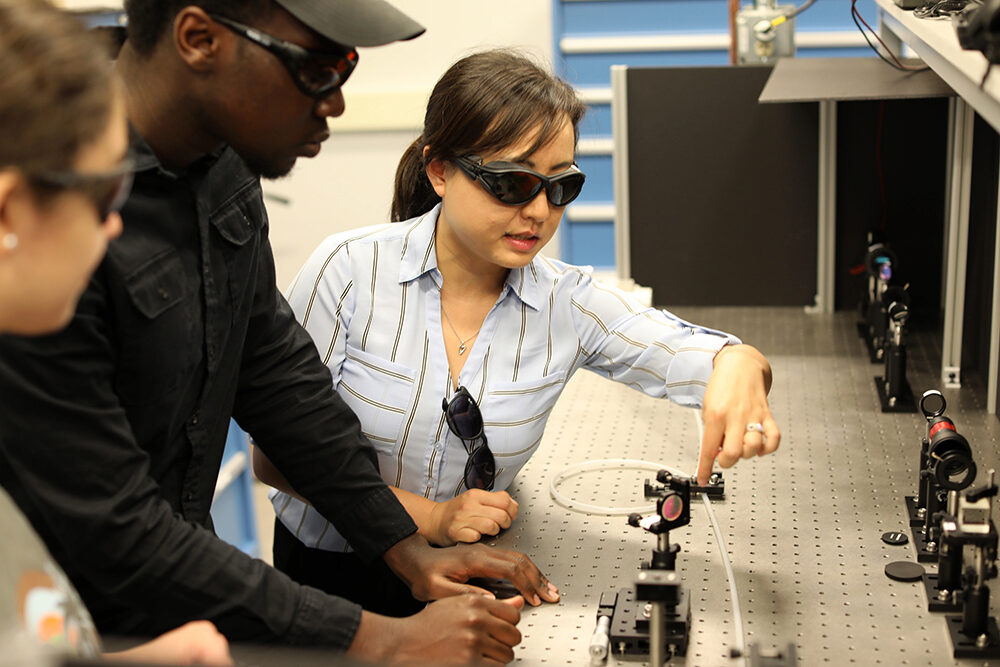Assistant Professor Ellen Yi Chen Mazumdar discusses teaching, research and her path to Tech.
Q: Tell us a little about you – where are you from and how did you end up at Tech?
A: I grew up in St. Louis, completed all of my degrees at MIT, and did my post-doc at Sandia National Laboratories. After my husband and I completed our post-docs, we both decided to come to Tech. I’ve only been here for six months, but have gotten a chance to work with some great students and professors.
Q: Why academia over industry?
A: At Sandia, I had many opportunities to do both application work and fundamental research. I found that I enjoyed the fundamental science the most because those problems had room for exploration and allowed me to make unique contributions. Academia is the ideal place for pursuing open-ended problems or exotic phenomena that can potentially have large impacts in many areas.
Q: What did you like about Sandia?
A: Prior to going there, my husband and I didn’t know much about Sandia in Albuquerque, New Mexico. After we interviewed, we found that the lab had a collaborative culture, tremendous talent, and a focus on solving important national problems. Sandia has great resources for one-of-a-kind experiments, enabling cutting-edge research. When I interviewed with the group at Sandia, I got along really well with the senior researchers and knew that I could work with them for many years to come. Whether you are looking for an internship or a permanent job, good group dynamics are key to enjoying your experience. At Sandia, I always knew I was working to solve the country’s most important and challenging application and research problems.
Q: Who has influenced you and your career?
A: I’ve had some really great mentors throughout my life: my Ph.D. advisor and both of my post-doc advisors helped me grow. They gave me a lot of intellectual freedom to try new things. They also introduced me to a bigger network of people in different fields, which has led to some of the collaborations that I still have today. I would also say my family, including my husband, have been very influential. Although he is in a different field, my husband is probably my biggest advocate and resource because I can bounce new ideas off of him and get honest feedback.
Q: What is your approach to teaching?
A: I have found that students all have different ways of learning, so you have to give them opportunities to look at problems from different angles. For example, I provide hands-on versions of the problems during lab exercises, blackboard theoretical versions of the problem during class, and simulation versions of the problem for homework. Exposure to similar problems from different angles gives every student a chance to find the way that clicks best.
Q: Have you enjoyed teaching at Tech?
A: Yes, my students at Tech have been excellent and I have enjoyed teaching them. The students did a wonderful job last semester on their final projects. We have posted videos of their control systems and mechanisms on the ME4012 website. Currently, I have three students in my lab doing research who are from my class last semester. The students at Tech are creative and work hard. Overall, it’s been a great teaching experience.
Q: What classes are you teaching in the fall?
A: I’m teaching motion controls ME4012, which includes a laboratory component.
Q: Why do you think it’s important for undergrads to gain research experience?
A: I think research experience is really important for undergrads even if they don't want to become graduate students in the future. Doing research in a lab gives you a chance to get one-on-one advice. Your mentor can also advocate for you or write reference letters. Focusing on solving an open-ended problem that you find interesting is also a great exercise. This enables you to learn new technical skills, gain physical intuition, and understand what types of jobs or research areas you would like to focus on in the future. I started doing undergraduate research in my Sophomore year. As a result, I got great mentorship and this experience help shaped my future career.
Q: What is your research field?
A: My research field is instrumentation, sensing, and diagnostics. I build instruments to measure a variety of phenomena related to high-speed fluid flows, energetic materials, and combustion. My group also builds novel sensor topologies and sensor systems for robotics.
Q: What research challenges are you currently working on in your lab?
A: On the fluids side, my lab is currently working on a method for correcting optical distortions generated by shockwaves and developing diagnostics to study energetic materials and high temperature gases. On the robotics side, we are currently generating magnetic sensor systems, creating magnetic fingerprinting concepts, and developing soft sensing/actuator topologies for continuum robots.
Q: What would you tell students who want to know more about your lab?
A: My lab develops new ways to make measurements. As a result of our efforts, we are able to make new types of measurements and observe phenomena that have not been studied before. New sensor systems also enable better control and perception for autonomous systems. If you are excited about observing or measuring new phenomena, developing new sensors and diagnostics may be of interest to you. Please feel free to contact me or my graduate students if you have any questions about our research.
Q: What got you into this field?
A: I did research as an undergraduate in a lab that focused on instrumentation for biological applications. When I was applying for graduate school and looking at the different research options, I found myself constantly thinking, “I could build a new and interesting instrument for making this measurement.” That perspective on science, in many ways ingrained by my advisor at MIT, has brought me into my current research field.


